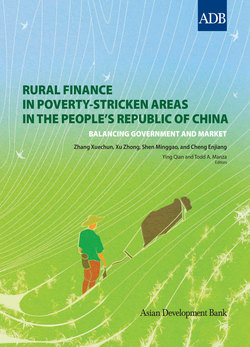Читать книгу Rural Finance in Poverty-Stricken Areas in the People's Republic of China - Xuechun Zhang - Страница 36
На сайте Литреса книга снята с продажи.
Dominance of the Rural Credit Cooperatives
ОглавлениеCompetition in the PRC’s rural financial markets is constrained by state regulation of the entry and exit of financial institutions. The ABC and the ADBC are government-owned financial institutions. RCCs, though defined as cooperatives, are subject to PBC regulation and management and have a corporate governance structure similar to that of state-owned financial institutions. It is virtually impossible for new financial institutions to enter the market, and there is no defined mechanism for individual loss-making RCCs with negative equity to exit the market.
Despite the creation of the ABC and the transfer of RCC management from the ABC to the PBC, the reforms of 1994 and 1996 failed to make rural financial markets more competitive. On the contrary, the reforms led to the gradual withdrawal of the ABC from rural lending and the collapse of rural cooperative foundations and other informal financial institutions, and the PRC’s rural institutional lending markets have become dominated by RCCs. Nonprice competition for rural deposits has become fierce, especially in more-developed areas, as the ABC continues to fight for rural deposits, and the share of deposits held by rural postal savings has grown over time.
Building on the experience of a pilot in Jiangsu Province, the 2002 National Financial Working Conference laid down the basic principles of RCC reform. The conference decided that one-size-fits-all organizational patterns are ineffective, that commercialization should be allowed in qualified regions, that management should not be vertical across the country, that microcredit should be continued, and that provincial governments should participate in risk mitigation.
In June 2003, the State Council launched the pilot RCC reform in eight provinces and cities, including Chongqing, Guizhou, Jiangsu, Jiangxi, Jilin, Shaanxi, Shandong, and Zhejiang. In August 2004, the pilots were expanded to 21 provinces, regions, and cities, including Beijing, Hebei, and Tianjin.
The 2003 pilot RCC reform was designed to solve the supply–demand contradictions between collective financial institutions and individual credit by improving the governance of financial institutions. Two Communist Party of China Central Committee documents, in 2004 and 2005, further defined the guiding macroeconomic policy principles behind rural financial reform, laying the overall foundation for a modern rural financial system in the PRC.
By the end of 2006, the RCC pilot reform was launched in Hainan Province, marking the national coverage of the reform (there are no RCCs in Xizang Autonomous Region7). The China Banking Regulatory Commission created rules to allow for the establishment of rural financial institutions such as rural banks and lending companies, opening a new chapter in the PRC’s rural financial development. Meanwhile, the pilot of new types of rural financial institutions was gradually expanded to increase competition in the rural financial market.
In June 2003, the State Council launched the pilot RCC reform in eight provinces and cities, including Chongqing, Guizhou, Jiangsu, Jiangxi, Jilin, Shaanxi, Shandong, and Zhejiang
The pilot RCC reform allowed private shareholding for ownership restructuring, which drew on the experience of restructuring township and small and medium-sized state-owned enterprises. Conducted under the leadership of the China Banking Regulatory Commission, the major reform measures included giving provincial governments authority for administering RCCs, issuing special central bank bills and loans to support the reform, and granting subsidies and tax exemption for the period 1994 through 1997.
The reform of postal savings is an important part of the state postal system reform
Unfortunately, the implementation of RCC reform has yet to address the issue of moral hazard. First, RCCs are not subject to bankruptcy and can incur losses in the name of supporting the rural economy. Second, local governments and RCCs might ask for unreasonably high compensation from the central government as a means of resolving historical burdens. Third, by exploiting the overlap of policy and commercial operations, RCCs can request central bank support, again in the name of supporting the rural economy.
